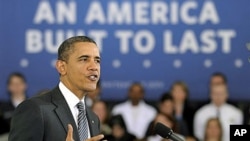President Barack Obama says the 2013 fiscal year budget he sent to Congress on Monday will reduce deficit spending in a balanced way by $4 trillion over the next decade and require wealthy Americans to contribute more, while preserving investments to help boost the U.S. economy.
Mr. Obama, who pledged to cut the federal budget deficit in half by the end of his first term, projects a $1.33 trillion deficit for this year. It will be the fourth consecutive year that the budget deficit will be more than $1 trillion, although declines are projected next year and beyond.
|
Obama Budget Plan Factbox |
|
Through a combination of higher taxes on corporations and the wealthy, and the presumed end of tax cuts on annual incomes exceeding $250,000 that were enacted during the George W. Bush administration, Mr. Obama proposes to raise $1.5 trillion in taxes over 10 years and reduce the federal deficit by $4 trillion.
The plan includes an agreement reached with Congress last year to cut $1 trillion as part of deficit and debt reduction. Savings from ending the wars in Iraq and Afghanistan, and reductions in defense spending are also figured in.
Under the proposed budget for 2013, $476 billion would go to upgrade infrastructure, $350 billion would be spent to create jobs - a reduction from Mr. Obama's $447 billion jobs bill that was blocked by Republicans lawmakers. Billions of dollars would be spent to hire teachers and police, repair schools, and promote research and development.
In remarks at a community college in suburban Washington, the president said the budget contains "tough choices," but reflects his determination to boost the economy through investments in education, manufacturing and clean energy.
"We can't cut back on those things that are important for us to grow. We can't just cut our way into growth. We can cut back on the things that we don't need but we also have to make sure that everyone is paying their fair share for the things that we do need," Mr. Obama said.
The 2013 budget projects about $360 billion in savings through adjustments in the large government health care programs - Medicare and Medicaid. About $278 billion would come from other cost-saving measures, including requiring more pension and other contributions from federal employees.
Republicans in Congress already have declared the proposal "dead on arrival."
The Speaker of the House of Representatives, Republican John Boehner, called it a reflection of "failed policies of the past" and a "collection of rehashes, gimmicks and tax increases" he said would weaken the U.S. economy. Boehner said Republicans will offer their own budget proposal in coming months.
Gene Sperling, director of the National Economic Council, which advises the president on economic policy, called Mr. Obama's plan balanced. He said it ensures strong momentum for economic recovery by laying out a framework for medium- and long-term fiscal discipline.
He challenged Republican lawmakers to come up with a plan that balances spending cuts with new revenue.
"Whether or not you agree with every measure in this budget, there is no question it achieves this type of balance between revenue and spending cuts. The only question is whether the House Republican budget that will come forward soon will, for the first time, include any semblance of that balance in their budget," Sperling said.
In his remarks, President Obama previewed the battle ahead with congressional Republicans over extending a payroll tax cut for 160 million Americans along with assistance for the unemployed. He urged lawmakers to support these steps "without ideological side issues."
The co-chairpersons of one of two key deficit reduction committees called Mr. Obama's budget a "serious step forward."
But former White House Budget Director Alice Rivlin and former Senator Pete Domenici say more needs to be done, including generating more government revenue, overhauling the tax system and dealing with the spiraling costs of major government "entitlement" programs.





